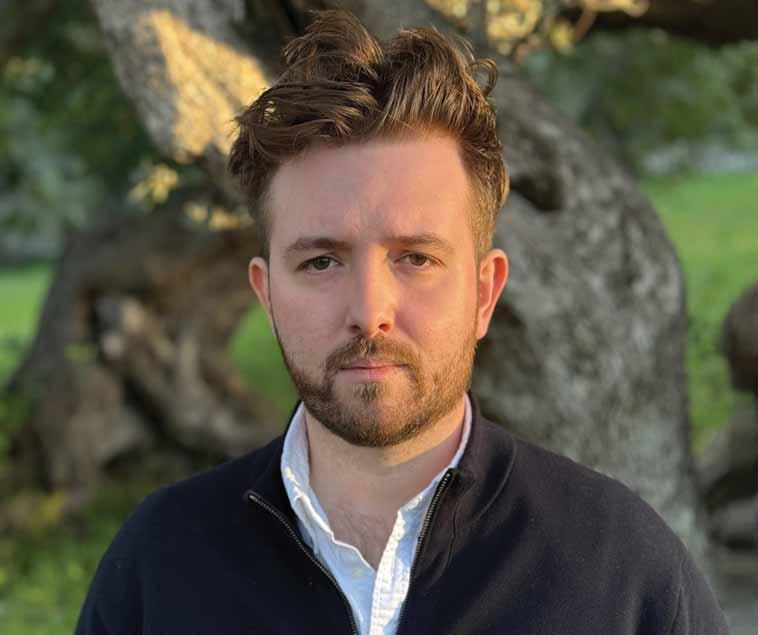
FOCUS ON THE GEORGIAN DREAM
POLITICO's Gabriel Gavin shares his views on Georgia's latest fall from grace PAGE 6
The Georgian Dream U-Turns: LGBTQ Rights, the Gender Quota and the Foreign Agent Bill
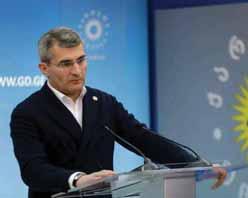
Georgian society has been pushed to aggravation this month – first with the provocative anti LGBT propaganda bill, then with the abolition of the gender quota for party lists, and now with the re-introduction of the “Russian Law” (foreign agents bill) just over a year since the Rustaveli riots against said bill
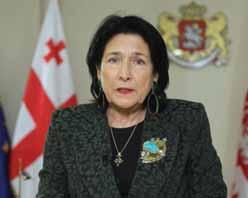
saw protesters hit with pepper spray, tear gas, and water cannons, and the bill withdrawn in recognition of wider society’s rejection of it.
With a stated 80% of the Georgian population claiming to support the country’s western orientation, which includes eventual EU and NATO integration, the latest apparent ruling party backsliding and moves in opposition to western values is alarming, to say the least.
"What is the purpose of this challenge?” President Salome Zurabishvili asked. “To cause chaos, destabilize, and baptize everyone as a radical, a
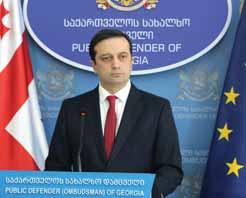
foreign agent, a supporter of the war party! These are very well-known tactics, and some of us have been through them before, many years ago. It's nothing new. Society is prepared for it. No one can divert Georgia from its path."
SUBMITTING THE HOMOPHOBIC BILL
As reported in GEORGIA TODAY last week, on March 25, the executive secretary of Georgian Dream, Mamuka Mdinaradze, said that they would initiate constitutional changes.
In this week’s issue...
Zero Waste Day in Tbilisi
Op-Ed | Georgia’s European Future: A Hope for Resolving Political Polarization
Brilliant Opportunity for Beginner Developers: Applications Open for Lineate’s New Dev School Program
Georgia Starts Validation of European Patents
PAGE 8
SOCIETY PAGE 8
Make Peace, Not Money!
Top Vegan Eateries in Tbilisi: A Guide for Plant-Based Earth Month
SOCIETY PAGE 9 BUSINESS PAGE 7 POLITICS PAGE 3
Nina Ananiashvili – Her Experiences, and How She
Kept Her Georgian Roots as a Bolshoi Ballerina
CULTURE PAGE 11 NEWS PAGE 2



Issue no: 1444 • • APRIL 5 - 11, 2024 • • PUBLISHED WEEKLY
PreparedforGeorgiaTodayBusinessby
PRICE: GEL
2.50
BUSINESS
Continued on page 4 BY TEAM GT
GD's Mamuka Mdinaradze, President Salome Zurabishvili and Georgia's Public Defender Levan Ioseliani
Zero Waste Day in Tbilisi
Tbilisi’s Mziuri Park came alive on 30 March as hundreds of people gathered to celebrate the International Day of Zero Waste, marking a step towards a cleaner, greener, and healthier lifestyle in Georgia.
Organized by the Caucasus Environmental NGOs Network (CENN), in partnership with the Ministry of Environmental Protection and Agriculture, and supported by the European Union, Norway, and the United Nations Development Program (UNDP), the day-long event drew guests, participants, and organizers alike to engage in interactive and educational activities promoting sustainable practices.
Highlights of the event included: Games and quizzes catering to both children and adults.
Exchange corners facilitating the redistribution of clothes and books.
Recycling and separation stations where local enterprises collected plastic and paper waste for recycling.
A business fair showcasing environmental practices spearheaded by Georgian companies.
“We are excited to host the International Day of Zero Waste in Tbilisi as part of our ongoing ‘End Plastic Pollution’ campaign! The overwhelming response underscores public commitment to a cleaner environment,” said Nana Takvarelia, CENN Project Manager.
“The concept of zero waste involves recycling any type of waste and turning it into a new resource. Modern waste

management practices have already been introduced through the Extended Producers’ Responsibility (EPR) on the following four waste streams: tires, batteries and accumulators, electrical and

Türkiye Elections: Opposition Wins in Istanbul, other Big Cities
Türkiye’s main opposition party has claimed big election victories in the main cities of Istanbul and Ankara.
The results are a significant blow for Recep Tayyip Erdogan, who had hoped to regain control of the cities less than a year after he claimed a third term as president.
Türkiye’s main opposition party has claimed victory in Istanbul and Ankara in local elections, inflicting the biggest defeat on President Recep Tayyip Erdogan and his Justice and Development Party (AK Party) in more than two decades.
Mayor Ekrem Imamoglu of the Republican People’s Party (CHP) said he had
defeated the governing AK Party candidate by more than one million votes.
Opposition supporters gathered in Istanbul to celebrate the results.
President Erdogan, 70, acknowledged the election had not gone as he had hoped, but he told supporters in Ankara it would mark “not an end for us but rather a turning point”.
Speaking from the balcony of his party headquarters in Ankara, he promised to use the four years before the next presidential election to “renew ourselves and compensate for our mistakes”.
About 61 million Turks were eligible to take part in Sunday’s election. Turnout was estimated at more than 77% across the country’s 81 provinces.
electronic equipment and oils. It is important to increase public awareness and engagement throughout this process,” noted Irma Gurguliani, Deputy Head of the Waste and Chemicals Man-
agement Department at the Ministry of Environmental Protection and Agriculture of Georgia.
“We need a comprehensive approach involving national and local authorities,
businesses, civil society, and experts. However, it all begins with people embracing the vision of a pollution-free world and uniting to safeguard their environmental rights,” added Lela Akiashvili, UNDP Project Manager.
Humanity generates over 2 billion tons of municipal solid waste annually, with approximately 2.7 billion people lacking access to proper waste management. This waste crisis exacerbates climate change, biodiversity loss, and pollution, posing significant threats to human wellbeing and economic prosperity. Without swift action, municipal solid waste generation is projected to reach 3.8 billion tonnes by 2050. (Source: UN-Habitat. 2023)
In Georgia, plastic production and imports have surged by 71 percent over the past decade, resulting in widespread illegal dumpsites, particularly in rural areas. Plastic accounts for over 95 percent of litter accumulated on Georgia’s beaches. In 2020, up to 93 percent of produced and imported plastic items in Georgia ended up as waste contributing to environmental pollution. (Sources: World Bank. 2021. EU/UNDP EMBLAS Project)
In response, UNDP and Norway, in partnership with the Ministry of Environmental Protection and Agriculture and CENN, launched an initiative to promote robust policies, enhance coordination, and foster engagement towards a plastic-free Georgia, ensuring every citizen’s right to a clean and healthy environment.
Ukraine Latest: NATO Chief Floats 100bln Euro Fund to Arm Ukraine
COMPILED BY ANA DUMBADZE
NATO Chief Jens Stoltenberg has proposed creating a 100 billion-euro, five-year fund for Ukraine in a push to get the alliance more involved in sending weapons to Kyiv. NATO foreign ministers held preliminary talks on the plan in Brussels on April 3, as they seek to forge a support package for Ukraine by the July summit in Washington. "Foreign ministers will discuss the best way to organize NATO's support for Ukraine, to make it more powerful, predictable, and enduring," a NATO official said on April 2.
Yet his plan drew a mixed response from NATO foreign ministers on Wednesday.
"We must ensure reliable and predictable security assistance to Ukraine for the long haul," Stoltenberg said ahead of the meeting, "so that we rely less on voluntary contributions and more on NATO commitments. Less on short-term offers and more on multi-year pledges."
"Every day of delay in the decision of the United States in providing more support to Ukraine has consequences on the battlefield," he said, adding that Russia is now able to "outgun" Ukraine.
Stoltenberg argued that creating more certainty with how Ukraine is armed and financed will also send a clear message to the Kremlin.
"We see Russia is pushing and we see how they try to win this war by waiting us out," he said. "We need to answer by sending a clear message of practical support, financial support, and an institutional framework that ensures that we are there for the long haul to be able to end the war."
NATO HAS RETURNED TO A
COLD WAR MINDSET, RUSSIAN FOREIGN MINISTRY SAYS
NATO has returned to a Cold War state of mind, Russia's foreign ministry said as the alliance's leaders met in Brussels during the week of the organization's 75-year anniversary.
"Today, in relations with Russia, the bloc has returned to Cold War settings," foreign ministry spokeswoman Maria Zakharova told press, according to a translation by Reuters.
Zakharova said NATO has no place in a "multipolar world," and that its 75th birthday is no reason to celebrate, Reuters reported.
As the war enters its 770th day, these are the main developments.
CIVILIANS,
3 RESCUE WORKERS
KILLED IN RUSSIAN DRONE STRIKE ON KHARKIV
A Russian drone strike in the Ukrainian city of Kharkiv overnight killed four people and injured 12, local authorities said on April 4. Ukraine’s General Staff said 20 drones had struck the country during the night and that 11 were disrupted by air-defense forces.
Kharkiv Mayor Ihor Terekhov wrote in a post on Telegram that one of those killed was a resident of a 14-floor apartment building that was struck by a drone, while the other three were rescue workers killed at the scene in a second attack.
Police reported drone strikes in the Kharkiv region cities of Lozova and Zmiyiv that damaged residential buildings and vehicles. There were no immediate reports of casualties.
The US-based Institute for the Study of War wrote on April 3 that Russia could be intensifying drone and missile strikes against Ukraine’s civilian infrastructure, particularly its energy grid, “to further pressure the Ukrainian command to deploy air-defense systems away from the front.”
Russia has denied targeting civilians since the beginning of its full-scale invasion in February 2022, and yet Ukrainian cities and civilian infrastructure are regularly hit by missile and drone attacks.
Ukrainian President Volodymyr Zelenskyy said Russia fired more than 3,000 guided aerial bombs, 600 drones and 400 missiles at Ukraine in March, as it stepped up its long-range air strike campaign on the country’s energy infrastructure.
He said he believes Russia is “preparing to mobilize 300,000 military personnel by June 1”, but provided no evidence. Kremlin spokesman Dmitry Peskov said the claim was untrue.
UKRAINE SHOT DOWN 4 RUSSIAN DRONES OVERNIGHT, MILITARY SAYS
Ukrainian air defenses shot down four Russian drones overnight in the eastern Donetsk region, the country's military said.
"On the night of April 3, the enemy attacked the Donetsk region with three S-300 anti-aircraft guided missiles, and launched 4 Shahed-136/131 UAVs from the Primorsko-Akhtarsk area of the Russian Federation," Ukrainian state news outlet Ukrinform quoted the country's air force as saying in a statement.
"Mobile fire groups" intercepted the Iranian-made Shahed drones in the regions of Khmelnytskyi, Zhytomyr, Kirovohrad, and Cherkasy, the statement added.
RUSSIANS SAID TO BE EAGER TO ENLIST IN UKRAINE WAR
Russia’s Defense Ministry said more than 100,000 people had enlisted for military service in the Russian armed forces so far this year, 16,000 of them in the 10 days after the attack on the Crocus City Hall. ISIS has claimed responsibility for the March 22 attack.
GEORGIA TODAY APRIL 5 - 11, 2024 2 NEWS
Photo: UNDP/Gela Bedianashvili
Photo: Reuters/Umit Bektas
Op-Ed | Georgia’s European Future: A Hope for Resolving Political Polarization
BY TAMAR SULUKHIA (ISET POLICY INSTITUTE, TBILISI), TINATIN AKHVLEDIANI (CEPS, BRUSSELS)
Political polarization erodes trust in public institutions, it damages political process, negatively affects economic development, distracts social development and relationships in society, and it may eventually lead to the backsliding of democracy. Georgia has been facing significant political polarization over recent years, which have had highly damaging effects on its fragile democracy and its aspirations for a European future. It is therefore no wonder that the European Commission included resolving political polarization among the nine conditions that Georgia needs to fulfill in progressing on its European path.
ISET Policy Institute’s new Media (de) Polarization Index is the first attempt to measure political polarization in Georgia by analyzing media polarization through the application of machine learning tools. The study has found an upward trend in the data since 2020, and it showcases the historic picture in January 2024. The Index highlights that polarization is mostly shaped by political and societal developments. More importantly, the study also analyzes the factors that decrease polarization in the country. Such depolarizing factors work through consolidating public and political players and institutions, such as in the early phases of the pandemic in 2020, when everybody shared the same position against the threats of the virus

and its devastating impacts. Another depolarizing event was found to be the Russian war in Ukraine, which caused notable solidarity and sympathy towards Ukraine throughout the whole of society.
One clear factor that decreased political polarization, not once but twice, has been Georgia’s European integration.
Namely, the Index saw a sharp decline in April-May 2021, with the active engagement of Charles Michel, European Council President. In an attempted resolution of the political crises in Georgia, he
undertook personal mediation of an agreement between the key political actors (the so-called “Charles Michel Agreement”). While, overall, the effort did not eliminate political polarization, it lifted the country out of a political deadlock. This positive development is reflected in the Index, which shows a temporary decline in media polarization and smoothening of the media space. The second substantial decline in media polarization was registered by the Index when Georgia received its much-desired Candidate Status for EU membership in
December 2023. In this case, the study found a convergence and consensus amongst the population and media, as well as between political and institutional actors.
Overall, the Index demonstrates that while political polarization in the country is concerning, depolarization can be driven by events that create an undebated consensus within society, and for political and institutional actors. Amongst the depolarizing factors, European integration-related events have reduced political polarization twice during crit-
ical periods. This serves as evidence that the EU’s support and engagement are valuable, and that they have helped navigate Georgia through challenging times. This emphasizes for Georgian political and institutional actors that such polarization can be resolved by prioritizing Georgia’s European future and implementing reforms that facilitate progress in European integration. In essence, while resolving political polarization may seem like a daunting task, there is hope on the horizon in the form of Georgia’s European future.
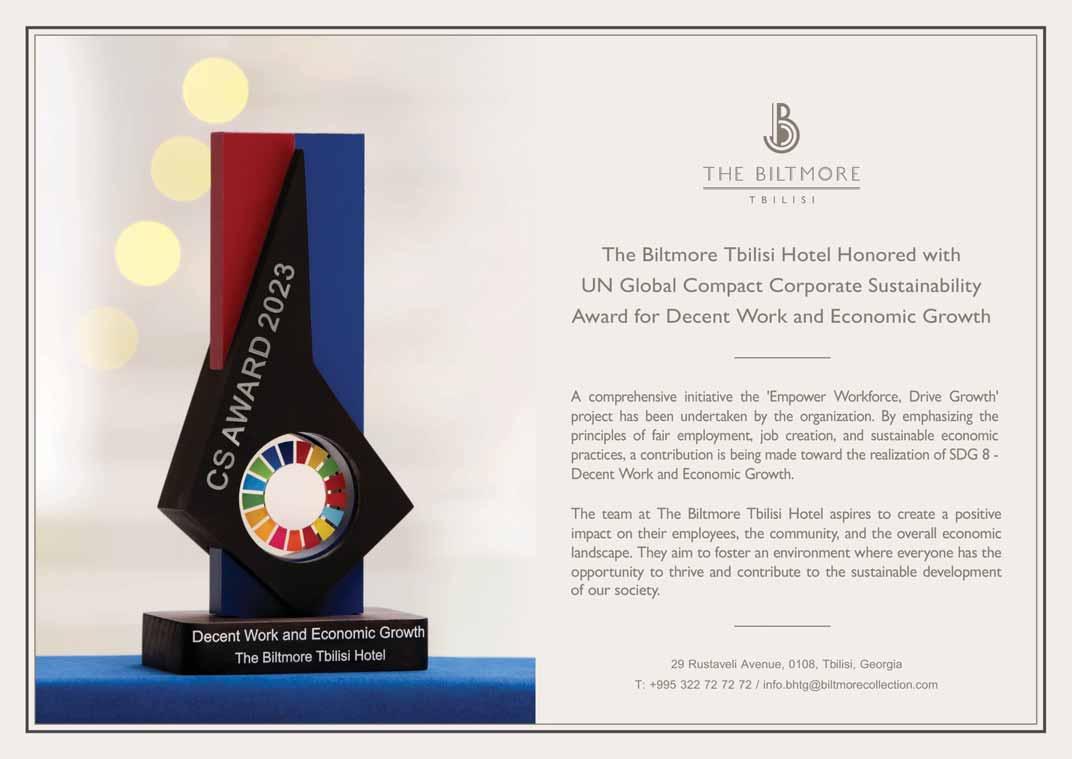
GEORGIA TODAY APRIL 5 11, 2024 3 POLITICS
POLITICS
The Georgian Dream U-Turns: LGBTQ Rights, the Gender Quota and the Foreign Agent Bill
Continued from page 1
These amendments prepared "against LGBT propaganda" were initiated Wednesday with the signature of the deputies of the ruling majority in parliament. Two constitutional initiatives have been registered: "Against LGBT Propaganda," a draft of amendments to the current constitution, and a draft of the constitutional law entitled "On family values and protection of minors."
Council of Europe Commissioner for Human Rights, Dunja Mijatovic, was among those who condemned the proposed changes.
“I am concerned about the present political discourse in Georgia, as illustrated by the announcement made by the Georgian Dream Party of their initiative to amend the Constitution and to adopt a new constitutional law on ‘Protection of Family Values and Underaged Persons’,” Mijatovic told the Council. “It is reflective of the entrenched harmful stereotypes and prejudice against LGBTI people which still prevail in segments of Georgian society, including some politicians, and is capable of having a strong, negative impact on the human rights, safety and well-being of LGBTI people and defenders of their rights. It also represents the political manipulation of LGBTI-phobia in the run-up to the elections.”
ABOLITION OF THE GENDER QUOTA
Georgian Dream this week said it is to support the Girchi party initiative, which provides for the abolition of gender quotas in the party list.
Based on the existing law on gender quotas, at least every 4th candidate in the party list should be of a different gender.
Georgian Dream member Beka Davituliani stated that the parliamentary majority supports consideration of the mentioned legislative changes in an accelerated manner, and noted that they have received consent from Girchi, in return for the selection of the CEC chairman being focused on the integrity and professionalism of the candidate and not for it to be used for personal political gains.
Girchi Chairman Iago Khvichiya thanked the members of the majority, because "for the first time in parliament, it was possible to talk about the case and reach some kind of agreement". Khvichiya asked the remainder of the parliamentary opposition to support the abolition of gender quotas, as it is a "morally important" issue.
The Public Defender of Georgia responded to and negatively assessed the draft law.
“For the democratic development of the country, it is necessary for women's voices to be clearly heard in the country's legislative body and other policymaking agencies, so that women's needs and measures promoting gender equal-

ity are kept on the agenda,” the Public Defender’s statement reads.
“These changes are particularly noteworthy in light of the fact that, contrary to the above, in 2022, the Parliament of Georgia supported the extension of gender quotas until 2032, and thus clearly emphasized the importance of women's political participation and the implementation of relevant necessary measures to increase women's involvement.
"The gender quota mechanism is not a privilege granted to women, but an important tool for eliminating discriminatory attitudes towards women, fighting stereotypes, and fulfilling international obligations.
"Women face invisible barriers every day, which can be eliminated, and substantial equality achieved in the country by improving the proportion of the mandatory gender quota and implementing other supportive measures. The planned legislative changes ignore the results of the long-standing struggle of women and worsen the existing mechanisms for achieving equality.
"For the democratic development of the country, it is necessary for women's voices to be clearly heard in the country's legislative body and other policymaking agencies, so that women's needs and measures promoting gender equality are kept on the agenda.”
Women's Movement in turn claimed that Georgian Dream and Girchi are “fighting against the participation of women in politics.”
The Movement, in their statement, also drew attention to the fact that the ruling party is going to cancel a law it previously endorsed.
"In 2020, the quotas were adopted by Georgian Dream itself, with the active involvement of (now) Prime Minister Irakli Kobakhidze, which resulted in the increase of women's representation in politics from 14% to 20%. Despite this progress, in terms of women's political participation, Georgia still lags behind other countries and ranks 125th globally.
"The Women's Movement believes that the preconditions for the abolition of
gender quotas do not exist. Such initiatives are a fight not only against women politicians, but against all women living in this country," leaders of the Women's Movement said, reading the mentioned statement in front of Parliament. They went on to highlight several points:
"We, women voters, are rallying to defend our rights and equality across the country, because this is the exclusion of women from public politics and the political life of the country;
"We, women voters, will stand firmly to protect women's political rights, because all women's rights rest on the right of women's political participation;
"We, women voters, demand more women in politics, the vast majority of people in this country demand more women in politics, because solving the problems of immigrants, single parents, people with disabilities, children and other vulnerable groups are what women's voices and women's visions in politics are needed for;
"We, the women voters, declare an uncompromising fight against the expulsion of women from parliament with the motive of including more millionaire men in the electoral lists, whose only goal is to protect their own business interests, not to protect the interests of the people;
"We, the women voters, will not allow the essential equality guaranteed by Article 11 of our Constitution to be violated, the decision of the Constitutional Court to be ignored, and our European integration to be pushed back;
"We, the women voters, will not tolerate this injustice, and we demand from all political parties to present us a plan for the empowerment of women - on election day, we will come to the ballot boxes to defend our rights! We will make up the majority of voters - 53%, and in the 2024 elections we will show the political groups that our vote is decisive!"
In a shocking turn of events, during a heated debate on the issue of the gender quota, Georgian Dream deputy Beka Odisharia attacked women deputies in parliament with foul language: “F*uck

heartening to see the Georgian government bring back the foreign agents law. All this does is further divide the country. It is similar to laws Russia uses to restrict civil society and suppress political opposition. A democratic government in Georgia should have no reason for it.”
Lithuanian MEP, Renew Europe Group member Petras Austrevicius, wrote on X: "It seems that the ruling party of Georgia is striving towards Euro-Asian tyranny. There is no compromise between the European Union and the latter, because democratic criteria are not subject to negotiations.”
you, you herd of unf*cked women, this is a syndrome of unf*cked women,” he shouted at them.
Public Defender Levan Ioseliani, in response, noted that insulting statements towards female politicians undermine the importance of women's participation in the decision-making process and reminded the public that, according to the Code of Ethics of the Parliament of Georgia, "Offensive, obscene, sexist, discriminatory speech, statement, action, or other use of hate speech is not permissible for the Member of Parliament." Accordingly, in all similar cases, internal mechanisms should be activated and the issue should be discussed by the Parliament.
The Public Defender has called on politicians and public figures not to use expressions containing sexist or other discriminatory content and to observe the principle of equality when performing public activities.
BRINGING BACK THE “RUSSIAN LAW”
On April 3, Mamuka Mdinaradze, announced the Georgian Dream’s intention to re-submit its foreign agents bill, with minimum changes to the wording as compared to the bill they introduced last March, a bill which led to mass protests and a riot in Tbilisi that police suppressed using tear gas and physical force. Mdinaradze said the bill will be initiated in parliament with exactly the same text as it was initiated with last year, with the only difference being that the term “agent of foreign influence” will be replaced by the term “organization carrying the interests of a foreign power”.
"All other notes of the bill are unchanged. We remind you that the draft law envisages the only requirement for organizations receiving foreign funding to publish their annual financial report, for the violation of which only financial sanctions are provided. This is the minimum standard of public accountability and transparency that any organization with even a formal claim to integrity must meet. Accordingly, the content of the draft law does not provide even a minimal basis for criticism. The draft law will be adopted by all three hearings by the end of the current session," he said.
Georgia's western partners, including the US and the European Union, consider the law an obstacle to Georgia's western integration, seeing its purpose as being to discredit and limit the media and civil sector in the country.
Negative responses to the planned resubmission were quick to flow.
Peter Stano, Spokesperson for Foreign Affairs and Security Policy, said, “The EU regrets that draft law on ‘Transparency of Foreign Influence’ is once again being considered, despite strong public and international reactions in March 2023.”
US Senators Jim Risch, ranking member of the Senate Foreign Relations Committee, and Jeanne Shaheen, chair of the Subcommittee on Europe and Regional Security Cooperation, released the following statement: “It is incredibly dis-
“GD made its statement very clearly - it said 'no' to Europe, in all directions which were written in the previous recommendations, and which are written in today's nine recommendations. Today, GD is busy sabotaging our path and our future,” said Georgia’s President Salome Zurabishvili.
“The ruling party of Georgia is declaring its intention to manipulate the elections by re-introducing the Russian foreign agents law,” ‘For Georgia’ party leader Giorgi Gakharia said. “Georgian Dream intends to completely destroy trust in national and international election observation organizations and their donors to prepare the ground for the public recognition of manipulated results. It’s time to unite efforts to protect the integrity of upcoming 2024 elections and the future!” he wrote on X.
“Georgian Dream has clearly stated that it does not want the European Union. This law means that they don't want the European Union,” ‘Strategy Aghmashenebeli’ deputy Giorgi Vashadze told journalists.
"October 26 [election day] is when the people must decide whether the opposition is winning, and bringing us the European perspective, jobs, investment and development, or if Georgian Dream is to win again, which will lead to hunger, 'greedy' officials and impoverished people. This is an unequivocal, direct, clear statement, it has no other explanation. It is a clear message to Europe and to everyone to 'Give us up',” Vashadze added.
Shalva Papuashvili, in response to protests voiced by the opposition parties in parliament, told the opposition: “The pathetic things you got away with last year won’t fly this year. We will not allow the spread of anti-Georgian propaganda. I will turn off the microphone to all who term the new bill as a Russian law!” Member of the European Parliament Viola Von Cramon reacted to his words from afar: “Shalva Papuashvili is a person who was employed by the German Society for International Cooperation for rule of law projects in Georgia - shame! How can Western donors be so misled as to employ people who do everything but respect the rule of law, who violate the rights of MPs in parliament, and who pursue Russian interests? Shame!”
Last year’s submission of the foreign agent’s bill led to large-scale demonstrations by many citizens of Georgia, culminating in the March 9 forced submission of protesters by the authorities.
As GEORGIA TODAY goes to press, a rally is beginning on Rustaveli Avenue, organized by civil organizations Geut and Talgha, and titled: "No to the Russian law."
“The result of all this, this usury, rudeness, and the immense insult to Georgia which is called the Russian law and Russian path, is set to cast away our European chances at the elections,” President Zurabishvili noted this week. “The overwhelming majority in the country knows what they want, and they want an independent European future for this country. We need to go to the polls. This requires the greatest mobilization. Not hopelessness, depression, pessimism, or unrest, but preparation.
“Georgia’s European path cannot be stopped. Nobody can take us back to the past! No Russian law, nor any other destructive policy can prevent a determined nation from achieving its goal.”
GEORGIA TODAY APRIL 5 - 11, 2024 4
The March 9, 2023 protest against the foreign agents bill
The March 9, 2023 protest against the foreign agents bill suppressed by water cannons
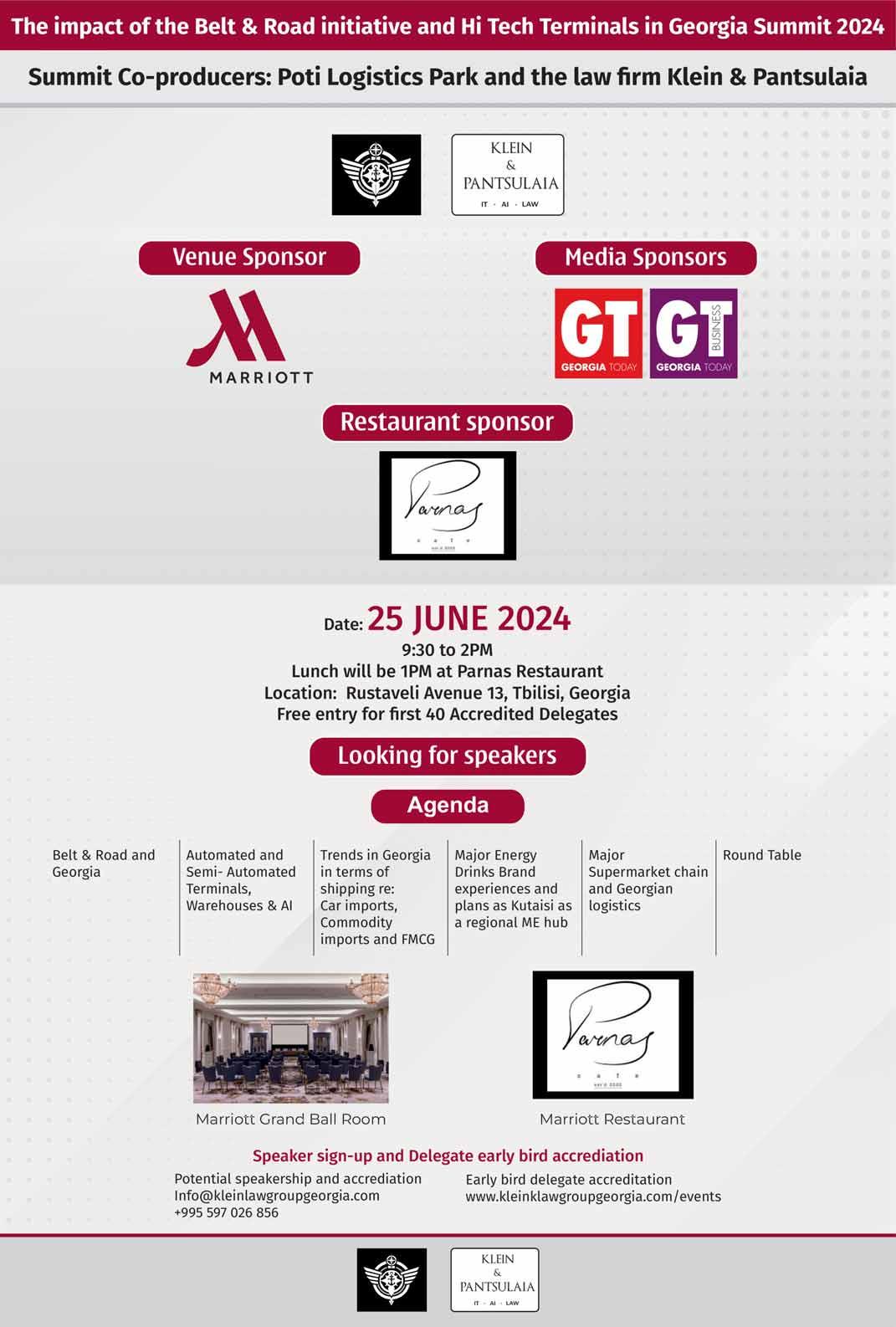
Gabriel Gavin on the "Russian Law" Repeat and Georgia’s EU Chances
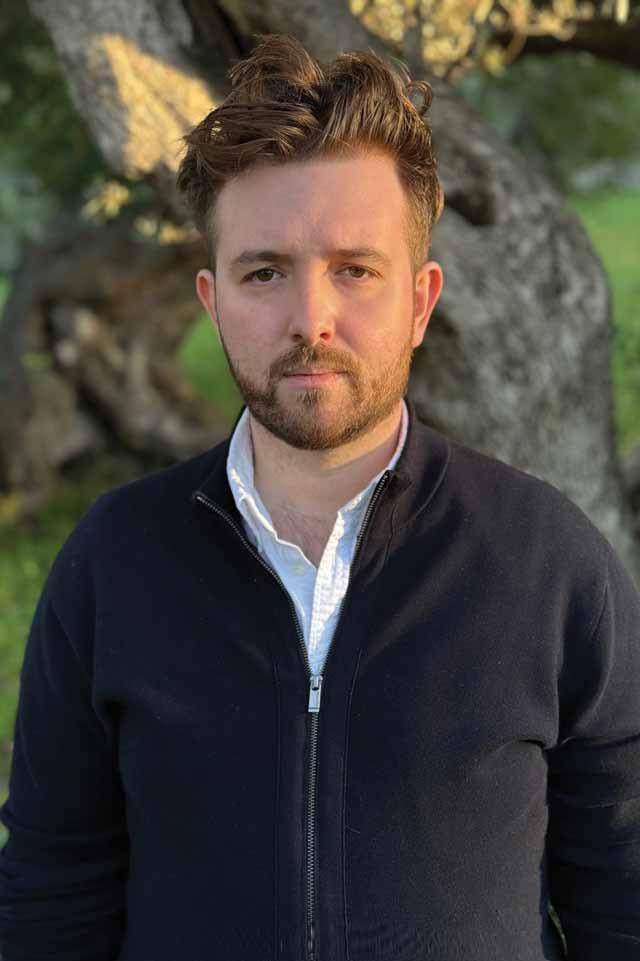 INTERVIEW BY VAZHA TAVBERIDZE
INTERVIEW BY VAZHA TAVBERIDZE
Gabriel Gavin is a British journalist and writer covering Eurasian politics and foreign affairs for POLITICO Europe. He has covered armed conflicts, political crises and economic upheaval from more than a dozen countries. He is also the author of a forthcoming book, ‘Ashes of our Fathers: Inside the Fall of NagornoKarabakh,’ due to be published in January 2025.
In our interview with him, Radio Free Europe/RL’s Georgian service began by asking how the Georgian government’s calling back the infamous foreign agents’ law will be seen in the West on one hand, and in Moscow on the another.
“I think it's worth considering that before the foreign agents’ law, Georgian Dream promised just last week to tighten
restrictions on LGBTQ+ people. We also saw the government opposing the process of vetting judges. What people in Brussels and Washington are seeing from Georgia, or from the Georgian govern-
Georgia is getting further away from the EU and not closer through these measures, which I think is a tragedy
fortable place to work.
I've spoken to many people in Georgia and the civil society sector there, and none of them feel they're operating on behalf of a foreign power: They say they are Georgian patriots doing what they can for Georgia. I think it would be very difficult to tell them they're not.
When it comes to Russia, the Kremlin will feel vindicated in a way, seeing that another country is using its model. And they will say: “Well, would you look at that, the West: Not everyone wants to live like you! Georgia, a country that you've brought closer, through all the EU and US efforts, even this country is now doing what we started.”
The same goes for the LGBTQ+ bill. It’s not a game-changer for the Kremlin, but it will definitely help Russia. Russia will be looking at whether it is winning or losing the battle for influence over Georgia. And I think it will conclude, with steps like this, that that battle is swinging in its favor.
WITH THE FOREIGN AGENTS’ LAW BEING BROUGHT BACK, SHOULD BRUSSELS FEEL THAT IT GOT DUPED?
It's clear that the Georgian Dream aren’t wholeheartedly committed to adopting everything the EU wants them to adopt in a moving-forward accession process. One of the things that would follow on from that is alignment on foreign policy.
The EU was very clear when it granted Georgia candidate status, that the status is not membership, and that Georgia had not achieved all of the things that the EU had hoped Georgia would achieve. The EU chose to move forward with the caveat that Georgia still has work to do. That decision was made on the basis of the Georgian people's continued European dream and not on the Georgian Dream political party’s record in office. Obviously, Georgian Dream will always take credit for that and say, look, this happened on our watch. But I don’t think Georgians want to end up in a situation like Turkey, where EU talks have been going on for 40 years, and there's no real pretense that it's going anywhere. Moldova and Ukraine have already moved forward with accession talks, and Georgia is not even at that point yet. And I think the longer that situation goes on, the more Georgians will start asking: Why? And with these legislation changes, it becomes a much, much longer and rockier path to joining the EU. Georgia is getting further away from the EU and not closer through these measures, which I think is a tragedy.
What we've seen in the last two years is that Georgia has been left behind in the region
didn't achieve anything positive for them. And now what they're trying to do is very carefully unpick the threads that bind them to Russia. Armenia has been part of the Russian Empire, was in the Soviet empire, for more than a century, 150 years. And I think that's a very difficult process to undertake.
Paradoxically, quite a few analysts, including in Brussels, have praised Georgian Dream, because Georgia shares a border with Russia, Russia's never going to go away, there’s always going to be an element of managing the Russians in Georgia's politics, of course. But I think this is now a question of outcomes. What the Georgian government says it wants to do is get membership of the European Union. And I think the steps it's taking are setting it back on that path, not forward. So if Georgian Dream has come to the conclusion that joining the EU would be a provocation for Russia, and they're too afraid of doing that, or if they think it would be negative for the Georgian economy due to its trade with Russia, they should come out and say: “Look, we don't think this is the right thing to do anymore,” rather than saying, “Yes, we love the EU, we're going into the EU,” and at the same time doing everything possible to slow down that journey. I think Georgians deserve honestly about this.
MANY THINK IVANISHVILI’S RETURN MEANS THAT HE WILL LEND HIS STATURE TO THIS LEGISLATION, SO FEWER PEOPLE WILL PROTEST IT, RELUCTANT TO TAKE TO THE STREETS AND OPENLY OPPOSE BIDZINA, “THE SAVIOR OF THE COUNTRY.”
ment, at the moment, is a series of legislative proposals that take the country further away from joining the EU, from being part of a more united Europe. The EU has been very clear in its recommendations, and suggested reforms that it provided to Georgia as part of the membership process: Georgia needs to work on human rights, needs to work on judicial reforms, and particularly needs to work on political polarization. And I think it's very hard to look at these measures and say they will make the EU think that that job is being taken seriously.
Obviously, the US is going to be particularly concerned, as Georgia has become a country that has in the past attracted a huge amount of US funding for NGOs and civil society; it has attracted projects that have made a real difference in the lives of lots of Georgians, and also changed the political discourse in Georgia. And if you have big agencies like USAID potentially being labeled as foreign agents, it becomes a very uncom-
One thing that will be particularly sensitive for Georgia is Armenia, its neighbor to the south, now having far friendlier, far better and far more productive relations with Brussels than Georgia does. For the last 10-15 years, Georgia was the golden country of the South Caucasus and most likely to be the first member state in the EU, no one else was going to come close and Armenia was effectively a vassal of Russia. But what we've seen in the last two years is that Georgia has been left behind.
PERHAPS ARMENIA IS DOING IT BECAUSE THEY HAD TO CEDE KARABAKH UNDER THE PRO-WESTERN PASHINYAN. A GEORGIAN GOV’T OFFICIAL WOULD TELL YOU, “WE DIDN’T LOSE ANY LAND, THERE WAS NO WAR ON OUR WATCH, UNLIKE THE FORMER GOVERNMENT’S, UNLIKE ARMENIA.” WHAT WOULD YOUR COUNTERARGUMENT BE?
I completely agree on the first point, that Armenia did this only after losing Karabakh. But why they did it is because they realized that dependence on Russia was a strategic failure; they realized that it
I think if you ask 100 Georgians what Ivanishvili’s plans are, you will get 100 different answers from them. His return to frontline politics is probably part of a far larger process than just one bill. And it may well be designed in a way that makes relations with the EU paradoxically easier rather than harder. Because one of the things that Brussels has always been pushing for is de-oligarchization. And there was really only one person that could apply to in Georgia, everybody was pretty clear that it's Ivanishvili. But now that he's a politician again, he can say, “well, I might be very wealthy, but I am still a politician, I'm not pulling the strings behind the scenes, which was the common perception. I'm actually actively involved in politics.”
We at Politico faced a lot of criticism in the past when we described Bidzina as being central to Georgian politics. And pro-government media would always be very critical and say: “No, he's an innocent businessman, who's just literally concerned about the state of the country, uses his money to support other politicians. That's it. He's not involved in politics.” And now that he's actually put his head above the parapet, that becomes impossible to say.
Now we can look at what Bidzina is doing internationally. We can look at what those around him are doing, and we can judge him on his record. It’s far better to know who's really in charge.
GEORGIA TODAY APRIL 5 - 11, 2024 6 POLITICS
Gabriel Gavin
Brilliant Opportunity for Beginner Developers: Applications Open for Lineate’s New Dev School Program
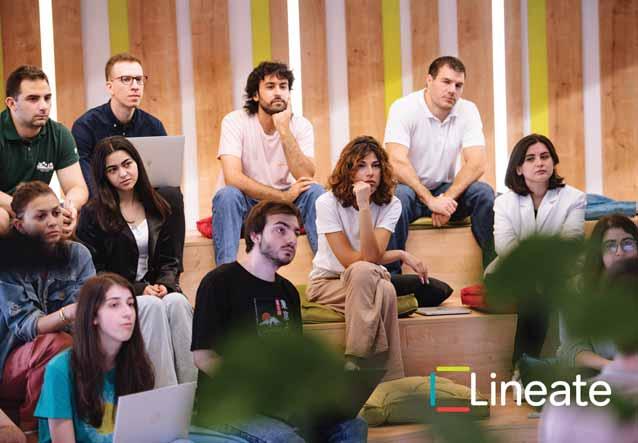
Lineate is currently accepting applications for its software training program, Dev School: Code Camp. This one-month Front-End program is an excellent opportunity for novice developers to learn the essential skills to become successful software engineers. During the program, students will learn important features, including HTML, CSS, JavaScript & TypeScript, and either React or Vue. The Code Camp program consists of
three stages:
1. Completing an application;
2. Testing, interviewing;
3. And finally, working on a one-month project to gain practical experience in the programming world. Each student will have a personal mentor to help them work on their project.
Lineate's Dev School program aims to bridge the gap between theoretical learning and real-world application, preparing students for the future of technology. Lineate is a leading implementer of
cloud solutions, helping Adtech and Martech organizations scale their technology to manage vast data volumes. The company's expertise in distributed systems and a unique culture focused on knowledge breadth and creativity set Lineate apart in a competitive industry. With a global presence spanning seven countries, their client base is primarily in the United States and Western Europe.
In 2022, Lineate opened a regional hub in Georgia to expand its business across Europe. The company's investment of
$14 million has significantly contributed to the country's economy by creating 200 new job opportunities. Additionally, Lineate launched the Lineate Dev School program aimed at helping aspiring developers. This program has trained 25 students out of 500 applicants in the past year, with five of the company's best performers employed as full-time developers.
Lineate has also awarded scholarships to leading students of computer science and mathematics programs at the Free University and Kutaisi International University. Additionally, the company has signed a memorandum of cooperation with six leading universities to promote education. It supports the interna-
tional Grace Hopper Award program, recognizing women's contributions to developing the Georgian ICT industry. The company aims to contribute to the country's economic development and social well-being.
Applicants interested in applying for the Dev School: Code Camp program can find detailed information on how to register on the company's website at www.lineate.com
Lineate continues to work towards making even more significant contributions to the country's economy while supporting the younger generation in gaining comprehensive knowledge in the tech industry, acquiring new skills, and pursuing opportunities.


GEORGIA TODAY APRIL 5 11, 2024 7 BUSINESS "Tsavkisi Park" - Live Peacefully in the Center of the City A Complex of Modern Townhouses in the Territory of "Tsavkisi Valley" www.tpark.ge | +995 595 014 444
Georgia Starts Validation of European Patents
On 15 January 2024, the International Agreement on validation of European patents between the Government of Georgia and the European Patent Office (the Validation Agreement) entered into force. The European Patent Office examines European patent applications and grants European patents respectively. The Validation Agreement ensures a fast and cheap way of obtaining a patent for an invention in Georgia by requesting validation of the European patent application in Georgia.
A patent is a document issued by the state that confirms exclusive rights to the invention, a technical solution in any field of industry. According to the Patent Law of Georgia, the registration of a patent is only possible if an invention is novel as well as industrially applicable and has an inventive step (i.e. its creation is not obvious for the specialist based on prior knowledge). An application for the registration of a patent should be submitted before the National Intellectual Property Center of Georgia (the Georgian IP Center) which is responsible for registering intellectual property rights in Georgia. Notably, the registration of a patent enables the patentholder to benefit from their invention on the territory of Georgia and prohibits other persons to use it without the patentholder’s permission.
The novelty and effect of the Validation Agreement is that, effective from 15 January 2024, the European patents registered by the European Patent Office
SOCIETY
will also benefit from such a scope of protection in Georgia after their validation by the Georgian IP Center. In this regard, the collaboration between the Georgian IP Center and the European Patent Office should be carried out in legal as well as administrative matters to ensure the effectiveness of the validation system. Furthermore, a joint committee should be established to discuss all matters arising from the Validation Agreement. The joint committee shall consist of representatives of the European Patent Office and the Georgian IP Center.
One of the fundamental approaches of the Validation Agreement is that the European patent application and the European patent validated in Georgia should be granted the same legal force and protection as the Georgian patent application and the Georgian patent. Accordingly, the European Patent Office will not grant a European patent if it is similar to a national patent that is already registered in Georgia. Therefore, this process will not only result in time and cost-efficiency for applicants, but also create a possibility to ensure legal certainty of these applications and patents from the perspective of both the European Patent Office and the Georgian IP Center. The validation process includes several stages to be followed. Firstly, according to the Validation Agreement, a request for the validation of European patents in Georgia should be submitted to the European Patent Office. This can be done by choosing Georgia as a validating country while submitting an application
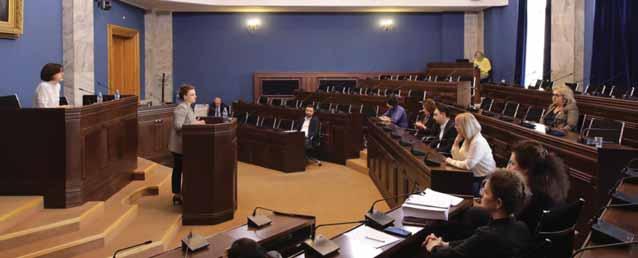
of the registration of a European patent before the European Patent Office. It is worth mentioning that the only European patent applications submitted from 15 January 2024 before the European Patent Office are subject to validation in Georgia.
As for validation fees, they must be paid to the European Patent Office within six months of the date of publication of the European search report in the European Patent Bulletin. The European Patent Office should then transfer any information on European patent applications and related proceedings to the Georgian IP Center.
At the next stage of the validation process, if a European patent is granted, the patent owner then has three months to submit a complete and precise Georgian
translation of the European patent to the Georgian IP Center and pay the fees established for publication. Notably, where the text of the formula of the invention contains references to drawings, such drawings should also be attached to the Georgian translation.
Once a European patent is validated in Georgia, it will be in force during the term of the European patent itself, provided applicable fees are paid for the maintenance of validation.
The Validation Agreement dated 31 October 2019 is valid for a period of five years and will continue for further fiveyear periods, unless the Government of Georgia or the European Patent Office express their objection in writing no later than six months before the end of the relevant five-year period. In case of
termination of the Validation Agreement, the provisions regarding the request for validating the European patent will still be applicable for: (i) Pending European patent applications, if the requests for their validation are submitted before the termination date; and (ii) European patents that are granted based on such pending European patent applications.
By executing the Validation Agreement Georgia, becomes the 5th country with the validation status and the 45th country where patent protection is possible on the basis of a European patent application. As we look ahead, this will also attract foreign investments in Georgia, as well as contribute to Georgia’s accession to the European Patent Convention and the process of Georgia becoming a member state of the European Union.
Make Peace, Not Money!
OP-ED BY NUGZAR B. RUHADZE
Talks about WW3 have become so commonplace, and conjectures on nuclear war so trivial, that nobody takes them seriously any more, aside, perhaps, from the deeplyversed-in-reality political scientists. Yet, our current, already unrecognizable, world simply must do something substantial and wisely practicable to avoid such a calamity and to maintain peace. There are a number of ways out there to do so, but only one stands out as the sharpest and smartest in the long run, and that is education! Yes, education oriented on peaceful coexistence on our planet!
Conventional thinking has it that only salable education is worth spending time, money, nerves and energy on. A Georgian student, whether they go to school here in Sakartvelo or anywhere else in the world, is compelled to double-down to acquire the kind of knowledge that can be easily, securely and gainfully marketed. Otherwise, future success might come into doubt. A college diploma as such is today valuable only in conjunction with employment potential, which itself is commensurable with the prestige and fame of the higher education institution studied in. In other words, the higher the rating of the university, the bigger the chance to find, with the help of its diploma, a desirable and lucrative job. That’s not to say, of course, that paradoxes are never seen; that a Harvard, Oxford or Sorbonne graduate might remain unemployed, whereas a Tbilisi State University alumnus may get lucky enough to make a fortune.
I mean no offense, of course – we all know quite well that those famous moneymaking American or European diplomas are not easy to earn. All of them are awful time-consumers, so much so that, I have heard, a student’s personal life becomes practically devoid of any pleasurable pastime.
This is the overall picture worldwide.

Yet, not much consideration is given to the presumption that no diploma, no knowledge, no degree, no qualification can only be good and productive if there is no peace in the world, and that is why
we have to study the art of making peace. Given that the current generation of decision-making politicians and diplomats have turned out to be incapable of maintaining said global peace, having
recently plunged into war atrocities, each of them insisting on their own truth and fairness, it is high time for the global academic world to start coining not only money-generating diplomas and cer-
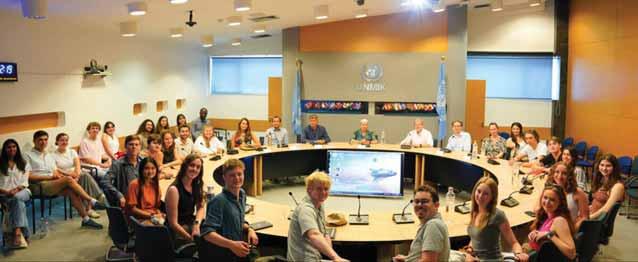
tificates, but also ones that make peace. Education must promote understanding, tolerance, and peaceful coexistence among the nations, using its power to lessen the probability of wars by nurturing critical thinking in the young, and giving impetus to sincere discourse and interchange. Education has the ability to prop and drive nonviolent societies and governments. It is crucial in our perilous times that universities, with deliberate consistency and continuity, develop interpersonal skills and values of peacebuilding in their students, in addition to the professional ability they are ready to provide.
If promoting peace, via building confidence and independent thinking, nursing problem-solving communication skills, and laying the foundation for political involvement, means anything, then a university, as the most outstanding educational institution, must be prepared to give the world young men and women with the ability to reduce support of militancy, violence and terrorism, build empathy and tolerance, and cultivate mutual respect between the nations, rather than opting for war to solve international issues.
As the Human Rights Convention would have it, education must prepare the young for a responsible life and effective participation in a free society, in a spirit of understanding, peace and tolerance. It could be proudly stated that there is an educational institution in Georgia which is working with its students in letter and spirit of this valuable postulate, and that is the Sokhumi State University, headed by Professor Zurab Khonelidze. The university teaches it as one of its core subjects, created by Khonelidze in the form of a book under the very curious title of ‘The University Diplomacy’, and they intend to do one of the courses in English. The book, already translated into many languages, is quickly gathering popularity all over the world, attracting the attention of the international community, who think that the peaceful development of humankind is absolutely in the hands of the future generation who is diligently studying peace,
GEORGIA TODAY APRIL 5 - 11, 2024 8 BUSINESS
its secrets, problems and benefits.
Undergraduate students, whose program has a specific focus on the role of international organizations in post-conflict peace- and institution-building, visit UNMIK (UN Mission in Kosovo) Headquarters in Pristina. Source: peacekeeping.un.org
This Master of Arts in International Peacebuilding program deeply engages students in a skills-focused application of interfaith learning that changes behavior and drives lasting change. Source: hartfordinternational
Georgian Govt, European Patent Organization discuss Validation of European Patents, August 2023. Source: georgiaonline
Top Vegan Eateries in Tbilisi: A Guide for Plant-Based Earth Month
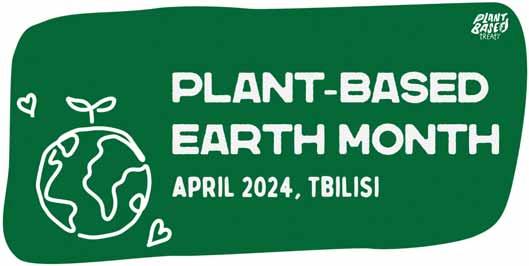 BY TEAM GT
BY TEAM GT
April marks global Earth Month, a time to reflect on our relationship with the planet and the interconnectedness of all living beings. Sadly, human activities are causing irreversible damage to our environment, with 2023 being recorded as the hottest year in history. Despite heightened concerns about the climate crisis, the significant impact of animal agriculture often remains unaddressed. The emissions from our current food system alone will make it impossible to meet our climate targets. Animal agriculture is a primary contributor to deforestation, biodiversity loss, land degradation, and air and water pollution. Eating a plant-based diet goes beyond personal preference; it is now a survival imperative. Luckily, going plant-based is a simple and enjoyable way to take action! Below is a compilation of dining spots in Tbilisi featuring entirely vegan menus, alongside businesses committed to expanding their range of vegan options. These establishments have united with nearly 150,000 others globally in supporting the Plant Based Treaty, emphasizing their commitment towards creating sustainable plant-based food systems.
GOLD STAR RECOMMENDATIONS - FULLY VEGAN ESTABLISHMENTS
1. PLANTASTIC KITCHEN

If you've ever thought vegan food was boring and restrictive, prepare to have your mind blown at this vibrant vegan bistro! Founded by TOP THE SHAKER - a popular vegan food creator on social media, this place oozes retro diner charm with its cute and lively interior. As you dive into dishes that prove everything you love can be veganized, you'll discover flavors so delicious, they'll make you question why you ever ate animal-based foods. Each bite is a delightful surprise. Don’t settle for meals that harm animals when you can enjoy the same, if not better, cruelty-free versions!
“We are proud that our plant-based food is much tastier than animal food. We believe that the future is vegan,” TOP THE SHAKER, owner of Plantastic Kitchen tells GEORGIA TODAY.
WHERE: 17 Giorgi Akhvlediani St, Tbilisi instagram.com/plantastickitchentbilisi
2. LUTRA LUTRA BAR

This cozy bar with vegan cuisine is run by a charming young couple, Irene and Ilia, and it’s tucked away in a quiet street in Old Tbilisi just a few steps away from the hustle and bustle of Liberty Square. Whether it’s a live music performance, a workshop event or a food special, there is always something new and exciting happening there, making this bar a fun and pleasant spot to hang out in with your friends, and where you’ll likely make a few new ones!
“We want to promote the ideas of vegan nutrition and show people new tastes and possibilities!” says Ilia Gorgiladze, co-owner of Lutra Lutra Bar.
WHERE: 15 Aleqsandre Diuma St, Tbilisi instagram.com/lutralutra.bar
3. DANER PIZZA

This popular pizza spot is proof that you never miss out on anything when you’re vegan! Drop by their window to indulge in their tasty Classic Pepperoni or Mushroom pizza. The size of these mouthwatering pizzas is perfect for one person; each baked with love and attention, and featuring the finest, tastiest toppings and top-quality dough. They even write your name on the box and tie a string around it like a gift, making each customer feel special! You can enjoy your pizza outdoors under the nearby gazebo, or if you prefer indoors, you can sit and eat at Lutra Lutra Bar which is just up the road (they have a mutual agreement for Daner Pizza customers). Of course, they offer delivery too. Remember - “Eat pizza, not animals!” as their motto goes!
“I make great vegan pizzas, and I want people to try them,” says Danya, owner of Daner Pizza.
WHERE: 4 Shota Nishniadize St, Tbilisi instagram.com/danerpizza
4. STRICHA

Step into a fairy tale world where all your sweet fantasies come true! Indulge in a heavenly array of desserts - from exquisite cakes to divine donuts, each treat is a masterpiece in both presentation and taste. But the magic doesn't stop there; Stricha’s menu highlights a delightful selection of vegan burgers, wraps, salads, and pasta, catering to all cravings. With both indoor and outdoor seating options, this is the perfect spot for a satisfying meal or a charming afternoon tea.
“I like to show people that vegan food can be as delicious as ‘regular’ food. I see a future where plant-based food will be perceived as a first choice. Therefore, active development towards gastronomic hedonism must take place,” Inga Apridonidze, owner of Stricha tells us.
WHERE: 16 Anton Purtseladze St, Tbilisi instagram.com/stricha.tbilisi
5. LIVING VINO: VEGAN FOOD AND KITCHEN

WHERE: 18 Shalva Dadiani St, Tbilisi instagram.com/livingvinogeorgia https://livingvino.ge
6. KIWI VEGAN CAFE
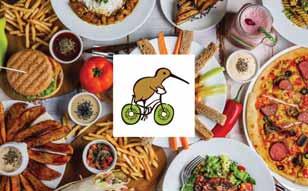
WHERE: 6 Ivane Machabeli St, Tbilisi instagram.com/kiwicafetbilisi
Living Vino is a fully plant-based kitchen in the city center, just a short walk from Liberty Square. They focus on takeout and delivery, but you can also dine at their neighbor So Lucky Bar after 7pm, or enjoy your meal on a Gudiashvili Square park bench nearby. Their address is Dadiani St, but you can also find them on the adjacent Lermontov Street. They offer a variety of street food, like burgers, wraps, bowls, salads, and soups. You can even order wine and frozen foods such as veggie patties, falafel, and dumplings from their market section. Living Vino is your go-to spot satisfying your hunger with wholesome plant foods!
Kiwi Vegan Cafe, Georgia’s first vegan cafe and proud winner of the 2023 Plant Based Treaty Awards for "Tbilisi's favorite vegan eatery", offers a cozy and welcoming atmosphere for all. Just a few minutes' walk from Liberty Square metro station, this cafe features a wide menu selection to cater to every preference, from burgers and burritos, sandwiches and bowls, to soups and pastas. Beyond being a cafe, Kiwi is a community that advocates for equality for all beings. They often host events like documentary screenings to raise awareness about animal exploitation and the environmental impact of animal agriculture.
7. BONUS: FOR THOSE WHO WANT TO COOK PLANTBASED MEALS AT HOME: PEACEFUL BUTCHER

Peaceful Butcher is a plant-based food brand offering a variety of chilled and frozen products like vegan burgers, dumplings and falafel, perfect for those looking to cook plant-based meals at home. Their products are available for delivery or can be purchased via Living Vino at 18 Shalva Dadiani St.
SEE MORE: instagram.com/peacefulbutcher/
Silver Star Recommendations: These restaurants and cafes have committed to incorporating more vegan options into their menus!
But First Cacao - 37 Alexander Griboedov St. Falafel Box - 26 Shalva Dadiani St. Fiesta: Tequila Bar & Mexican Cuisine - 17 Atoneli St. Pizza Verde - 26 Shalva Dadiani St.
HOW YOU CAN TAKE ACTION FOR PLANT-BASED EARTH MONTH!
1. Sign the Plant Based Treaty (at plantbasedtreaty.org) as an individual to endorse the global initiative for plant-based food systems.
2. Visit the mentioned businesses and express your appreciation by leaving a review on the HappyCow app.
3. Download a free copy of the Vegan Starter Kit booklet at linktr.ee/pbt.ge
4. Watch eye-opening documentaries such as “Dominion” (2018) and “Eating Our Way To Extinction” (2021).
5. Get involved with local vegan groups such as Vegan Georgia and Plant Based Treaty Tbilisi by becoming a volunteer!
GEORGIA TODAY APRIL 5 11, 2024 9 SOCIETY
Of Brontosauri and Empty Tombs
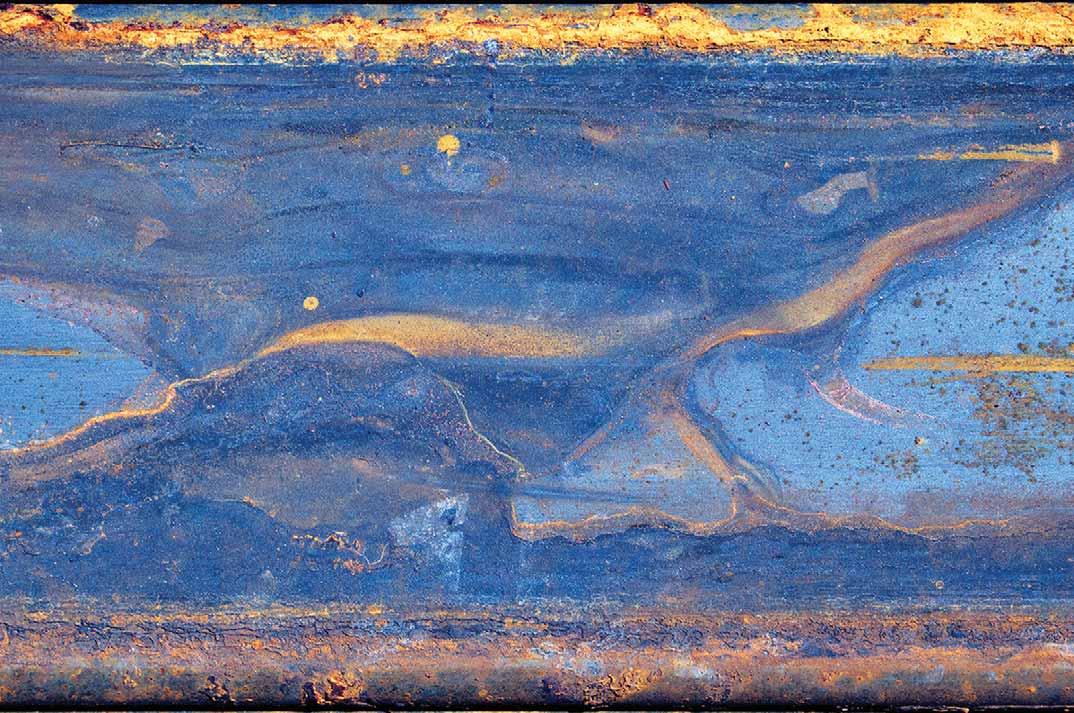
That’s what turns up when you go to a place where all the images are abstract, AND you have an eye for such oddities. You fi nd them.
It was the day before (Western) Good Friday, the fi rst date of our Easter… and once again I found myself back at that place which draws me as if I’m the magnet. All that iron, speci fi cally a whole steelyard’s worth, the largest one in the country and open to whatever weather the sky chooses to bestow upon it.
With at least a few months between my visits, there’s been time for two crucial things to happen, either one or both. Customers come, buy some sheets or pipes or I-beams, and expose the next layer(s) to the elements. Or, barring that, there’s been rain, and that has altered the topmost layers of everything with a little more rust. Or, like I said, both of these things. This time was the fi rst of my five visits when they had to use a forklift to take the top sheet of a whole stack of 2mm thick ones, about 5 or 6m long by 2 or so wide. At that size, it’s fl oppy, not stiff. So when the forks of the lift get under it and start lifting it, it bends, and then gets dragged off the sheet under it, with a bit of scratching hap-

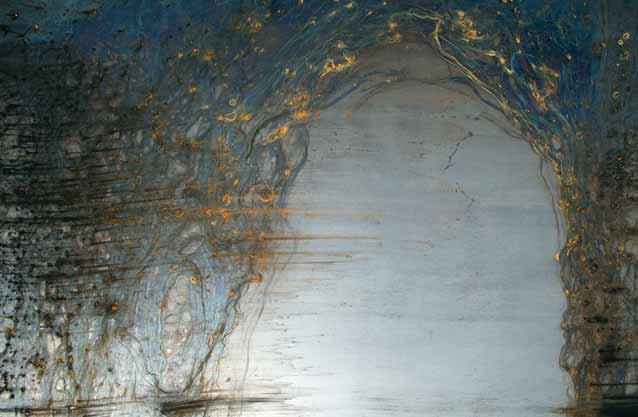
pening as they rub against each other. I saw, and fi lmed, the whole thing because I hadn’t seen it before.
Then I waited for just a few minutes in the warm sun for the newly revealed sheet’s leftover rainwater to dry off it, as the last rain had been only a couple of days before. There it was, a brand new surface to marvel at and explore with my camera. This is where the image of an empty cave or tomb came from, just in time (for me) for Good Friday and its following Easter Sunday. As for “Brontosaurus Waiting for the Meteor Apocalypse”, as I called my next fi nd… that was on one side of a square tube with width about 10 or 12cm, and showing more rust, because it had been out in weather for longer than the huge sheets. So, typically these pieces have smaller scenes with less blue (usually) and more warm rust tones, although here I found a good mix. There was nothing else to call this piece than what I went with: That’s exactly what it is, and it can’t really be anything else, I think.
“Alien Family Stroll” could certainly be called other things by other people,
however. But this is what I see in it; it’s also from that freshly discovered steel sheet. I marvel, shoot, and m ove on to the next intrigue.
They’re fairly used to me showing up by now. This time, though, I had fi nally gotten around to having two pieces of my work framed for them. One of the posters from last fall’s Rust exhibition in the city, which featured 16 of my photos… and one of those photos itself, called “Angel”. The guy who runs the place accepted them with thanks and put them straight on the wall. The door remains open for me, and I’m pulled back time and again. The magic never fails, new every time, has never so far got old. May it never.
Tony Hanmer has lived in Georgia since 1999, in Svaneti since 2007, and been a weekly writer and photographer for GT since early 2011. He runs the “Svaneti Renaissance” Facebook group, now with over 2000 members, at www.facebook. com/groups/SvanetiRenaissance/ He and his wife also run their own guest house in Etseri: www.facebook.com/hanmer.house. svaneti
GEORGIA TODAY APRIL 5 - 11, 2024 10 SOCIETY
BLOG BY TONY HANMER
Nina Ananiashvili – Her Experiences, and How She Kept Her Georgian Roots as a Bolshoi Ballerina
 BY SHELBI ANKIEWICZ
BY SHELBI ANKIEWICZ
Nina Ananiashvili, a former Bolshoi ballerina, kept her Georgian roots while she was dancing in Russia and around the world. Dance critic and historian Dr. Ismene Brown held an open interview with Nina on March 29, where she went into detail about her experiences and history with the ballet.
Nina tells us that every time she received a review from a critic, they always mentioned “Georgian” in their descriptions, though she didn’t know how they knew, supposing it was from her dark hair and eyes, or the fact she always dressed in all black, which is stereotypical of Georgian culture. Dr. Brown agreed, noting that when she saw Nina perform in 1999, she knew she was Georgian without any particular sign of it.
Although Nina always identifies as a Bolshoi ballerina, since she was with the company for such a long time, she still embraces her nationality.
“I was born Georgian, I am Georgian,
and I’ll die Georgian. Where I’m dancing doesn’t matter, they just want to watch me,” Nina says.
Born on March 19, 1963, the youngest of three, Nina says no one in her family had an artistic background. However, they had family friends who were artists. She recalls her father taking her to her first opera at the age of four or five. Then, later, when she was around six, the New York City Ballet came to the Philharmonia in Tbilisi. Nina said she desperately wanted to attend, but the event was sold out. Her father stood outside the venue waiting for someone to give up their ticket or for a spot to open, and, luckily, five minutes before the show, they snagged seats in the last row.
She remembers being stunned by the costumes the dancers were wearing, and how magical it all was for her. Looking back, Nina explains how children have pure, true reactions, so it’s good for them to see performances at a young age.
“I always say ballet is a unique art, because you don’t need language,” she says. “You just watch, and either you like it, or you don’t.”
The young ballerina started as an ice skater before she ever put on a ballet
slipper. She says her mother always took her skating while she was growing up, since she was often sick, and a family friend said the cold would help. She notes, though, that the ice rink in Georgia was (and still is) disappointingly small, and if someone ever wanted to pursue it as a career, they needed to go to Moscow, and not everyone could do that.
Nina tells her interviewer that ice skating is great preparation for ballet, but on ice one has flat feet, whereas ballet requires one to stretch their feet. This was a hard transition for her, but once she caught on, she soon began to excel.
Nina talks about a teacher, Elena, who saw her when she started dancing at the Tbilisi Choreographic School. At the time, compliments were rare, but she recalls Zhemchuzhina speaking with her parents about her dancing: “Your child has something. Not talent, because that’s saying too much, but something,” Nina quotes her.
After this, the future prima ballerina was recommended to go to Moscow, where she joined the Bolshoi school and lived for 12 years. She explains how exciting her experience was arriving in Russia, yet somewhat depressing, as at first she didn’t fit in. Nina says she showed up on the first day in the wrong attire, because no one had told her of the school’s uniform policy, nor had she studied the Russian language.
“When I moved there, it was like Chinese, but I needed to learn all my subjects in Russian,” she tells us.
As time went on and she became established within the Bolshoi Ballet, Nina says her teachers were the ones who taught her how to behave. She recalls that during her time at the Bolshoi, many ballerinas were offered the chance to perform or join other ballets, and even though being a ballerina during Soviet times was a status, they would still be controlled by the authorities.
Nina explains how the Bolshoi Ballet would hide invitations and create excuses if they didn’t want one of the ballerinas to travel. Due to this, she says, “mind games were being played.” Later, she was invited to perform in the Royal Ballet in London, which she accepted, and was then asked to be a part of the ballet fulltime.
She said she declined the offer because she wanted the freedom to travel and perform in different places, which is how she ended up dancing for 16 years in the United States. She was invited as the first Soviet Union ballerina to be a part of the New York City Ballet that had been established by George Balanchine, himself a native Georgian. It was a company she had seen perform years earlier at the Philharmonia in Tbilisi. It was quite literally a dream come true, though in the dream of her childhood, she was invited there personally by Balanchine, but, sadly, Balanchine had died by the time she arrived in the US.
Years later, Nina tells us, she was invited back to Georgia by former president Mikheil Saakashvili. Upon her arrival, one of her teachers was the famous
Vakhtang Chabukiani, who is said to have set the stage for modern ballet dancers.
Since 2004, the prima ballerina has continued her role in the fascinating art as Ballet Artistic Director of the Zakaria Paliashvili Tbilisi Opera and Ballet Theater, and as the Artistic Director of the Vakhtang Chabukiani State Choreographic School. She says that this August and September, the State Ballet of Georgia will perform Swan Lake, a ballet that the whole world has come to embrace.
***
The interview was organized by FORM, a study-abroad university program located in Tbilisi for UK and US, universities. Nina thanked both Dr. Brown and FORM, noting she was happy to share her experiences with the attendees, which counted university students, the Vakhtang Chabukiani School's ballet students, and the Friends of the Georgian Ballet. Here are some reactions from the audience:
“Nina Ananiashvili is a one-of-a-kind complete artist. Listening to her telling pieces of her story, in her unique, generous and spirited way, with images popping up in one’s mind, was truly inspiring. I feel privileged to have had this opportunity,” - Anne, a Friend of the Georgian Ballet.
"It was an amazing experience, listening to Nina's stories! She is such a warm and pleasant personality that you forget she is a true star, a prima ballerina, and a world-class artist! She was so generous with her time and memories of her childhood, her career, her partners; I will treasure every moment of this evening with beautiful Nina," - Larissa, a Friend of the Georgian Ballet. "How courageous it was of Nina to lift the curtain and share her personal feelings with us! The message to the students

was 'If you want to make it, you can make it, you just have to give your all! If you have a goal, you can make it, and it's worth fighting for'," - Annette, a Friend of the Georgian Ballet.
"The conversation between Nina Ananiashvili and Dr. Ismene Brown was magnificent. We listened to interesting facts and stories about ballet and Nina’s youth. We saw her stunning performances which was a motivation for the young generation. Nina Ananiashvili must be an example for ballerinas, and this interview was a great opportunity for the students. Overall, the audience enjoyed the event - we saw the ballerina's life 'from the other side'," - Irakli, a Friend of the Georgian Ballet.

GEORGIA TODAY APRIL 5 11, 2024 11
GEORGIA TODAY PUBLISHER & GM George Sharashidze COMMERCIAL DEPARTMENT Commercial Director: Iva Merabishvili Marketing Manager: Natalia Chikvaidze EDITORIAL DEPARTMENT: Editor-In-Chief: Katie Ruth Davies Journalists: Ana Dumbadze, Vazha Tavberidze, Tony Hanmer, Nugzar B. Ruhadze, Mariam Mtivlishvili, Erekle Poladishvili, Shelbi R. Ankiewicz Photographer: Aleksei Serov Website Editor: Katie Ruth Davies Layout: Misha Mchedlishvili Webmaster: Sergey Gevenov Circulation Managers: David Kerdikashvili, David Djandjgava ADDRESS 1 Melikishvili Str. Tbilisi, 0179, Georgia Tel.: +995 32 229 59 19 E: info@georgiatoday.ge F: GeorgiaToday ADVERTISING & SUBSCRIPTION +995 555 00 14 46 E-mail: marketing@georgiatoday.ge Reproducing material, photos and advertisements without prior editorial permission is strictly forbidden. The author is responsible for all material. Rights of authors are preserved. The newspaper is registered in Mtatsminda district court. Reg. # 06/4-309 Nina Ananiashvili and her coach Raisa Struchkova, Bolshoi Ballet. Source: FB
CULTURE
Nina Ananiashvili. Source: FB
Nina Ananiashvili. Photo by Anastasiya Fedorenko













 INTERVIEW BY VAZHA TAVBERIDZE
INTERVIEW BY VAZHA TAVBERIDZE






 BY TEAM GT
BY TEAM GT










 BY SHELBI ANKIEWICZ
BY SHELBI ANKIEWICZ


